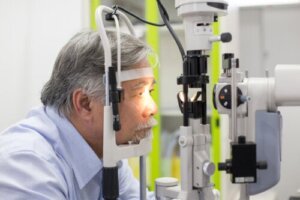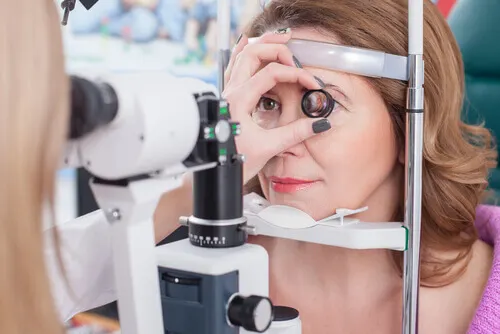Preventing Macular Degeneration


Reviewed and approved by the doctor José Gerardo Rosciano Paganelli
To date, there is no 100% effective method to prevent age-related macular degeneration (AMD). In fact, doctors still do not know with certainty what causes this disease. However, a number of factors have been identified that increase the risk of developing it. Therefore, it’s a good idea to make some lifestyle adjustments if you want to lower your risk of developing this condition.
Avoiding alcohol and tobacco consumption, maintaining a good diet, wearing sunglasses, and requesting regular medical check-ups are some of the measures that can help you to take care of your visual health and prevent this disease. Do you want to know more about it? If so, keep reading!
What is age-related macular degeneration (AMD)?
As explained by the American Academy of Ophthalmology, age-related macular degeneration (AMD) is a disease caused by the deterioration of a part of the retina known as the macula.
Specifically, this disease causes the loss of central vision, which means that the ability to see fine details both near and far is lost. However, peripheral vision continues to function normally. It can resent itself in two forms: dry macular degeneration and wet macular degeneration.
Age-related macular degeneration is considered “dry” when certain parts of the macula thin and produce a clump of proteins known as drusen. This is the most common form of the disease and is estimated to account for 80% of cases.
Wet macular degeneration, on the other hand, is caused by a growth of abnormal blood vessels under the retina. It’s a more severe form of this condition, as these blood vessels scar the macula.

We think you may also enjoy reading this article: 10 Solutions for Bags and Dark Circles Under Your Eyes
The risk factors for macular degeneration
As mentioned above, there are several risk factors that increase a person’s likelihood of developing age-related macular degeneration. Many of these factors – such as genetics, age, and family history – are not modifiable. However, others can be intervened by improving your habits.
Let’s take a closer look at what can increase the risk of developing this disease.
- Age: Up to one-third of adults over age 75 may develop this condition.
- Family history: You are more likely to have it if a close relative already has it.
- Gender: Women are more likely to have it than men. This factor is associated with the greater longevity of the female sex over the male one.
- Genetics: In general, Caucasians are more likely to develop this condition. Similarly, light-colored eyes are more likely to have the dry form of the disease.
- Smoking. The oxidative stress caused by smoking increases the risk of macular degeneration up to 5 times and worsens the progression of the disease.
- Sun exposure: Although the evidence is not entirely conclusive, the impact of ultraviolet rays is thought to accelerate retinal damage.
- Diet.:Patients who consume too much sugar, fat, and high glycemic index foods are more exposed to this disease.
- Sedentary lifestyle and obesity: In sedentary people, oxygenation of the retina is hindered, and the probability of damage increases. In addition, obesity increases the risk up to 2.5 times more.
- High blood pressure: High blood pressure levels lead to the constriction of the blood vessels that nourish the retina, which reduces blood flow to the area and increases the risk of this condition.
8 recommendations to prevent macular degeneration (AMD)

Improving your lifestyle can contribute significantly to the prevention of macular degeneration. After all, many of the risk factors stem from bad habits that can be corrected. Therefore, following the recommendations of the University of Michigan Academic Medical Center, it is wise to heed the following:
- Quiet smoking and avoid all exposure to tobacco.
- Know your family history to determine if there’s a history of the disease. If so, it’s advisable to increase medical check-ups with your doctor or ophthalmologist.
- Improve your diet and increase the consumption of foods with antioxidants, such as green vegetables. In addition, it’s advisable to eat orange and yellow fruits that are rich in beta-carotene, as well as omega-3, whole grains, and fresh fish.
- Exercise at least 30 minutes a day, 3 to 5 times a week.
- Wear sunglasses, caps, or hats when in the sun.
- Monitor and control your blood pressure levels.
- Control your body weight and, if necessary, lose weight.
- Try an Amsler grid. This is a tool of vertical and horizontal lines that have been used for decades to monitor or inspect people’s visual field.
Like this article? You may also like to read: What Colors Look Good on You According to Your Skin, Hair, and Eyes
Overall, following all these recommendations can minimize your risk of macular degeneration, although not completely. In any case, it’s advisable to ask your ophthalmologist about other preventive measures, especially if there’s a reason for concern. Keep this in mind!
All cited sources were thoroughly reviewed by our team to ensure their quality, reliability, currency, and validity. The bibliography of this article was considered reliable and of academic or scientific accuracy.
- Ambati, J., & Fowler, B. J. (2012). Mechanisms of age-related macular degeneration. Neuron, 75(1), 26–39. https://doi.org/10.1016/j.neuron.2012.06.018
- Boyd, K. (Feb. 28, 2020). What Is Macular Degeneration?. American Academy of Ophthalmology. Disponible en https://www.aao.org/eye-health/diseases/amd-macular-degeneration
- Hogg, R. E., Woodside, J. V., McGrath, A., Young, I. S., Vioque, J. L., Chakravarthy, U., … & Fletcher, A. E. (2017). Mediterranean diet score and its association with age-related macular degeneration: the European Eye Study. Ophthalmology, 124(1), 82-89.
- Joy, K. (January 23, 2019). 7 Healthy Habits to Help Prevent Macular Degeneration. Michigan Medicine University of Michigan. Disponible en https://healthblog.uofmhealth.org/7-habits-to-prevent-macular-degeneration-perfcon
- Lim, L. L., & Guymer, R. H. (2008). Age-related macular degeneration. In Garner and Klintworth’s Pathobiology of Ocular Disease, Third Edition (pp. 371–392). CRC Press. https://doi.org/10.5005/jp/books/12194_9
- Lim, L. S., Mitchell, P., Seddon, J. M., Holz, F. G., & Wong, T. Y. (2012). Age-related macular degeneration. Lancet, 379(9827), 1728–1738. https://doi.org/10.1016/S0140-6736(12)60282-7
This text is provided for informational purposes only and does not replace consultation with a professional. If in doubt, consult your specialist.








